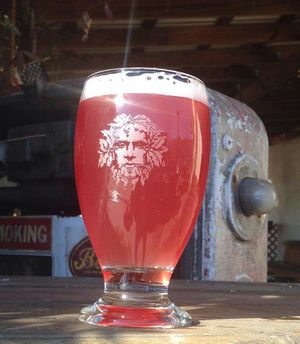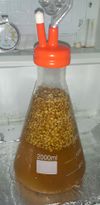Alternative Bacteria Sources
Sources for Lactic Acid Bacteria, especially Lactobacillus, are available in various forms such as unpasteurized products and probiotics. This page contains a list of sources that Milk The Funk members have experimented with, and their results. Note that the production of products such as probiotics may not be as sanitary as brewing industry yeast manufacturers, so without isolating these bacteria on agar plates, they should not be considered pure cultures.
Contents
Yogurt Souring
Yogurt Souring refers to the method of souring wort using unpasteurized yogurt. Greek yogurt is often made with Lactobacillus acidophilus, a lactic acid producing bacteria that is also associated with some health benefits [1]. Using cultures of L. acidophilus from yogurt reportedly can make a 3.0-3.5 pH sour wort in 24 hours, without producing vomit/fecal flavors and aromas. To sour 5 gallons of wort with yogurt, make a 1 liter batch of unhopped starter wort the day before brew day. Add 2-4 teaspoons of live yogurt to the starter wort. Maintain a 100-110°F (37.8-43.3°C) temperature for about 24 hours. On brew day, and after the 24 hour sour starter is finished, mash and sparge a low IBU wort as normal, boil for a few minutes, and then chill the wort down to 100-110°F (37.8-43.3°C). Pitch the yogurt starter into the wort, and hold the temperature as close to the 100-110°F (37.8-43.3°C) range as possible. Bubbling CO2 through the wort is advised if possible to prevent potential off flavors, but is not required. Within 24 hours, the wort should be down in the 3.x pH range. Boil the wort, adding any hops that the recipe calls for, yeast nutrient, etc., and then cool the wort down to Saccharomyces pitching temperatures. Bob's your uncle! [2]Brands of Yogurt
In general, non-fat Greek yogurt that is unpasteurized works best. Brands of yogurt that have been reported to be successful with this method:
Culturing Lactobacillus From Grains
If the brewer wants to use the LAB found naturally on the husks of grains, and doesn't want to risk pitching grains into the entire batch of wort, a starter culture can be made. The benefit of this is that if the culture contains flavors of butyric acid or other off flavors, it can be thrown away and tried again. The following is Derek Springer's grain starter process [5]:- In a 2L flask make a standard starter wort (1.040 OG).
- Add 1/2 tsp 88% lactic acid (should get pH down < 4.5).
- Add 2 cups uncrushed malt (using acidulated malt is not required).
- Top off with carbonated water.
- Cap with an airlock.
- Keep as warm as you can for 2-3 days, ~110°F is best.
- After 2-3 days, strain the grains out using a colander. Pitch the entire starter into the wort using one of the above discussed methods.
Culturing from Probiotics
Some commercial probiotics have been successfully used to produce Lactobacillus cultures (many brands have also failed at providing usable bacteria according to some homebrewers [6]). As a general rule of thumb, it should be noted that these probiotics may not be as free of contaminates as pure cultures from brewing industry yeast labs. The following probiotics are examples of brands, methods, and results that MTF members have had [7]. Dried forms of Lactobacillus should be stored refrigerated because viability has been seen to decrease as much as 80x when stored at room temperatures [8].
- Drew Wham has used GoodBelly products [1] as a source of L. planetarium. Their product contain 20 billion cells of the 229v strain of L. planetarium per serving. In a 5 gal batch a single serving will reduce the pH to 3.2 in 48-72 hours held at 95°F.
- Swanson Probiotics L. planatarum, reported by Ed Coffey. 3 capsules were used in 750ml of a DME starter wort, plus yeast nutrients for 24 hours at 90°F. The starter was pitched into 3 gallons of Gose wort. 72 hours of Lacto only ferment at 95°F resulted in a 3.31pH. No gravity reading taken.
- Dan Graston also used the Swanson Probiotics: 1 capsule in 1 quart of canned starter wort (1.039, 4.44pH, not DME) at 90°F. Starter pH barely dropped for first 24 hours because the Lacto powder just sank to the bottom and never went into suspension, which was unexpected. After rousing, the pH dropped to 3.23 over the next 36 hours. No drop in gravity. Test starter, so no beer was produced.
- LactoGG, reported by Allen Stone. 2 capsules were used in 1 liter of 1.030 wort, and held in high 90°F's for 72 hours before stepping up to 5 liters and pitched after another 7 days. The powder from the capsules fell to the bottom of the starter initially and needed rousing before it started fermenting.
- ProViva SuperFrukt (Sweden), good results reported by Viktor Nyman on MTF [9].
See Also
Additional Articles on MTF Wiki
- Sour Worting
- Commercial Sour Beer Inoculation
- Mixed Fermentation
- Wild Yeast Isolation
- Lactobacillus
- Pediococcus
External Resources
- Brewing with Yogurt. The Not So Professional Beer Blog.
- Gosebier - Fermented with a Sauerkraut Culture? Ryan Brews Blog.
References
- ↑ Lactobacillus acidophilus Wikipedia page. Retrieved 3/3/2015.
- ↑ Conversation with Mike Karnowski of Green Man Brewery on the MTF Facebook group. 3/3/2015.
- ↑ 3.0 3.1 Mark Fry on the MTF Facebook group. 2/19/2015.
- ↑ Brewing with Yogurt. The Not So Professional Beer Blog. Retrieved 3/3/2015.
- ↑ Conversation with Derek Springer on Milk The Funk. 4/4/2015.
- ↑ Conversation on Reddit. April 2015.
- ↑ Conversation on MTF about using Probiotics. 5/22/2015.
- ↑ Conversation with Bryan Heit on Milk The Funk. 05/04/2015.
- ↑ Conversation with Viktor Nyman on Probiotics available in Sweden on MTF. 5/27/2015.

